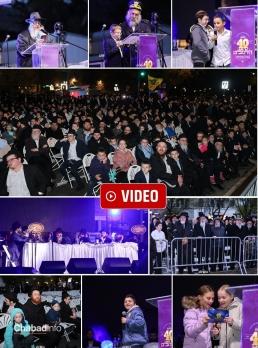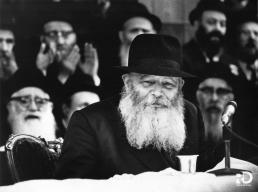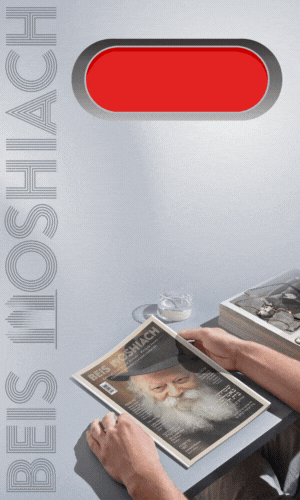Preparing for the ‘Families of Nations’ For Redemption
From the desk of Rabbi Nissim Lagziel, Mashpia in Oholei Torah: At the beginning of parshas Yisro, we read about Yisro’s visit to the desert. We know that Yisro took along Tzippora and her two sons so they would be reunited with Moshe after their long separation • Full Article
By Rabbi Nissim Lagziel, Mashpia in Oholei Torah:
BEGIN WITH A GRIN
A young lady brought her fiancé home and after supper her father sat down to talk to the young man. He asked him about what he did and the bachur said he learned Torah. The father asked him whether he would be able to provide his daughter with a nice house as she was used to, and he said, “B’ezras Hashem.”
When the father asked him about a nice diamond ring, the bachur said, “I will learn and Hashem will help us.”
That’s how the conversation went on with the bachur saying, “Hashem will help” for everything.
When the young man left, the daughter asked her father for his impressions of her fiancé. Her father said, “He has no job and no plans. The good news is, he thinks I’m G-d.”
FAMILY REUNION
At the beginning of parshas Yisro, we read about Yisro’s visit to the desert. We know that Yisro took along Tzippora and her two sons so they would be reunited with Moshe after their long separation.
The usual way of explaining the fifth verse of the parsha, “And Yisro, Moshe’s father-in-law, and the sons and wife of Moshe, came” is that it refers to Yisro’s coming with Tzippora (Moshe’s wife), Gershom and Eliezer (Moshe’s sons). The holy Zohar though, explains it altogether differently in a surprising and interesting way.
According to the Zohar, the words “his wife and children” refer to Yisro’s wife and sons! That would be Moshe’s mother-in-law and brothers-in-law. This explanation needs an explanation… Why would Yisro shlep his wife and sons to the desert? After all, the Sinai Desert 3300 years ago is not like a visit to Dubai today… There was nothing there!
The Zohar comes to the rescue and explains that this family visit in the desert was meant to bring Yisro’s wife and sons under the wings of the Shechina. Yisro knew that it was impossible to become a Chassid without going to the Rebbe. It can’t happen by remote control. So, if he wanted to influence his family and turn them into Jews, each of them had to go together with him to Moshe in the desert.
[As we say in Chabad, it’s not enough to go to the Rebbe in a Shnas Hakhel; you need to bring the entire family too!]
It sounds logical and convincing with a Chassidic message but if you think about it, it’s odd. Where do find in the Torah that Yisro had sons? Although we haven’t read or heard about Yisro’s wife until now, and we don’t know her name or how old she was, obviously, if Yisro had daughters (seven, in fact!) then he certainly had a wife.
Here, the Zohar pauses and goes back in time and teaches us that history always repeats itself. Previously, in the book of Bereishis, we learned that Lavan, Yaakov’s father-in-law, also had no sons. This is why he sent Rochel with the sheep to draw water. After all, even a degenerate like Lavan wouldn’t send a three-year-old to draw water if he had other children, males, who could do it. He simply had no choice, since he had no sons.
Twenty years later, when Lavan pursues Yaakov on the latter’s trip back to Canaan, the Torah says that Lavan had sons! He took them along on the chase. So, what happened here?
(Vayeitzei 30:27), “And G-d blessed me because of you,” says Lavan to Yaakov. Before Yaakov came, Lavan had no sons, but after his protracted stay in Lavan’s house, Lavan had sons. The very same thing happened with Yisro with his son-in-law, Moshe. At first, Yisro only had daughters which is why he had to send them out with the sheep; there was no one else to send. But after Moshe lived in Yisro’s home, Yisro was blessed with sons. It was those sons that he brought now to meet with Moshe.
Two similar stories about the special connection and blessed impact between a son-in-law and his father-in-law, Yaakov and Lavan; Moshe and Yisro.
DIFFERENT FAMILY DYNAMICS
However, despite the similarity in the stories, there is one, big, significant difference. Yisro came to the desert with his family so Moshe would convert them, while Lavan not only did not convert but he arrogantly maintained, “The girls are my daughters and the boys are my sons.” Obviously he did not allow any of them to convert. What can we learn from this difference between the two?
Yaakov lived before Mattan Torah which is why he did not have the power to influence his father-in-law to convert, but Moshe, through whom the Torah was given (in our parsha), had the power to effect a complete birur in the family of his father-in-law and converted them all.
The Rebbe explains that as we are moments before the fulfillment of the promise, (Tzefania 3:9) “For then I will convert the peoples to a pure language that all of them call in the name of the Lord, to worship Him of one accord,” we need to try and be involved in refining the nations of the world. This is done through convincing them to keep the seven Noahide Laws. Nowadays, when many Jews have contacts with non-Jews in the workplace, it is much easier to impact them, in ways of pleasantness and peace, regarding the importance of observing these mitzvos.
Today, one can explain to a non-Jew that G-d wants this for his own good which is why He sends a Jew to convince and explain to him the importance in these laws. Nowadays, unlike previously, the non-Jew will respect the Jew for looking out for his welfare, and this will lead to the fulfillment of the promise, (Yeshaya 49:23), “And kings shall be your nursing fathers and their princesses your wet nurses; they shall prostrate themselves to you with their face on the ground, and they shall lick the dust of your feet…”
TO CONCLUDE WITH A STORY
We will end with a story about the impact of a Lubavitcher son-in-law on his father-in-law. This story was told the Rebbe at a Yud-Tes Kislev farbrengen in 5719.
“The tzaddik, Rabbi Yosef Yitzchok of Avrutch, grandfather of the Rebbe Rayatz for whom the latter was named, was the son-in-law of the tzaddik, Rabbi Yaakov Yisroel of Cherkassy. When R’ Yaakov Yisrael asked his son-in-law how he was accustomed to pray, he replied that he tried to pray with a tzibbur. R’ Yaakov Yisroel was satisfied with his answer.
R’ Yaakov Yisroel once sent someone to call for R’ Yosef Yitzchok and the messenger found him still standing and praying. R’ Yaakov Yisroel wondered about this since the minyan had already ended.
After a while, he sent his servant again and R’ Yosef Yitzchok was still praying. This repeated itself several times over a long period of time. When R’ Yosef Yitzchok finished praying, R’ Yaakov Yisroel asked him: Didn’t you tell me you try to daven with the tzibbur?
R’ Yosef Yitzchok said that he heard from his father, the Tzemach Tzedek, in the name of the Alter Rebbe, that davening with the tzibbur means “litzbor,” to gather and collect all one’s soul powers and all the sparks, and that took him a long time.
Good Shabbos!
33
Join ChabadInfo's News Roundup and alerts for the HOTTEST Chabad news and updates!








































